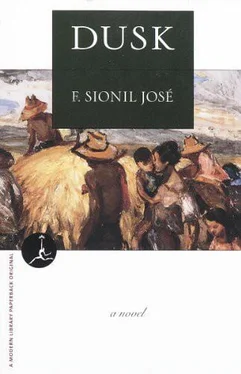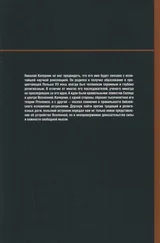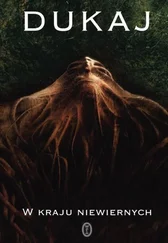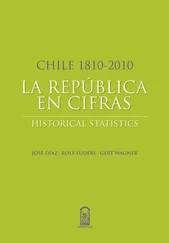He marveled at how easily and quickly he had revealed himself to her, but this new kinship would surely go to waste, for very soon they would part.
The river was far behind them. They neared the fork of the trail, where she was to leave him. Clouds of dust whirled ahead and a man on horseback was cantering toward them.
Istak reined in the bull and pulled the cart to the side of the path. It was only the wealthy or Guardia Civil officers who rode on horses, and as the rider drew near, Istak recognized Capitán Berong in his finery, white coat and silver-studded squash hat.
The mestizo stopped.
“Good afternoon, Apo,” Istak said, bowing in greeting.
Capitán Berong’s father, a Peninsular, had settled in Cabugaw after serving in the Spanish army and acquired large tracts of land which he had passed on to his children from a union with a mestiza from Vigan.
“So it is you, Eustaquio,” the capitán said, recognizing the teacher of his daughters. “How fortunate that I should meet you on my way to your village. Now I don’t have to ride that far …” He wiped his face, burnt to a reddish pink. His leather boots were dusty. “I have been riding since morning, visiting barrios — not just yours. I don’t like going around with the bad news, telling people of the misfortune that has befallen them …”
So what his mother had prophesied was coming true. But how could he believe in auguries after the many years during which he had learned from Padre Jose that much of the suffering in this world was man’s own doing?
Capitán Berong appreciated beauty whether it was in horses or in women, even if they were the lowly daughters of his tenants. His eyes were on the young widow. “I have not seen you before,” he said. “Who are you?”
Istak answered for Dalin. “She has just been widowed, Señor. She is staying with us …”
“It does not concern her then.” The mestizo dismissed her, although his eyes were still on her. “It is about you, your family — and that sitio where you live.”
“Yes, Apo.”
Capitán Berong stroked his wisp of a beard and turned away as if he could not tell the young man the bad news to his face. “You have to leave the sitio , Eustaquio, you and your whole family. The new priest has been studying his books. He thinks the yield of the land is very low. He wants to give the land, in fact, all the land in your sitio , to a new set of tenants. Tenants he likes.”
The words sank deep. “You are sure that this is what he wants, Apo? I cannot believe that this is so,” Istak said, his throat gone dry.
Capitán Berong turned to him and nodded. “Yes, Eustaquio. These were his words. If it may comfort you — you are not the only ones. In the other villages — there will be changes, too. Some families he does not want …”
Istak wanted to say more, but Capitán Berong looked at him with great severity. “I do not speak rashly. You can stay in your village the rest of your life. You can keep the accounts for me and teach my children and the children of my children. It is better this way. Your fate is still yours to change.”
“What should I do then, Apo?”
“Go see Padre Zarraga. Perhaps you can dissuade him.”
“And if he refuses to see me?”
Capitán Berong seemed vexed with him. He pulled at the reins of his horse and wheeled around. “Tell the others in your village. Their fate is the same, only your family goes first. The rest can go after the next harvest season.” In a while the chestnut horse and its rider had disappeared in a swirl of dust.
The sun was hot. Istak steered the cart to the shade of a camachile tree. This was where he would leave her and he would then walk back to his village to bring the news.
“But why should the priest send you away?” Dalin asked.
“For many reasons,” Istak said. “Maybe he Does not like us.”
“But why now?” She was persistent.
Istak did not reply. Yes, there was reason for the priest to send him away from the church and though he was never told, Istak knew it was because he had seen. But to banish all of them, there must be a more stringent reason other than guilt, for Istak was an unerring witness to a mortal sin the new priest had committed; he was a debaucher, the way Padre Jose could never be. He recalled again his mother’s warning that Dalin was a foreboding. He coveted the oval face, the dark, inquiring eyes. She was truth, she was life — but she had been cast adrift, without moorings, as he, too, had been. If only they could go together wherever the wind would blow them.
“Are you really going to leave Po-on? Where will you go?” Dalin asked as Istak got off the cart. It would be the last time he would see her.
“If this is what God wills …”
“It is not God’s will,” Dalin said.
“There is always land for those who want to clear it,” he said.
“Is that what you will do? Look for new land? I have told you what I have seen.”
“And it is so far away,” Istak said, but quickly there flashed in his mind the vast valley well beyond Tirad and across many ranges. What Dalin had seen would not be much different. Would he have the will to leave Po-on or Cabugaw itself? And how would he tell his father, who had poured his sweat into the little plot he did not even own?
Dalin continued evenly, “I can go with you. Part of the way. Then I won’t have to travel alone.”
Istak turned to her — dark eyes beseeching. He smiled, and in a leap, he was beside her on the cart again. Yes, it was the right thing to do, the kindly thing to do — she would go with them since she had nowhere else to go. Where would it lead? There seemed to be no way he could elude what he himself had wanted to escape, this Po-on to which, like most of his people, he had been chained. But she was here, flower to the eye, and this was not good-bye.
He told her then how it was more than ten years ago. It was as if he were on the same cart, only he was not returning to Po-on, but leaving it instead. Padre Jose had come to say Mass, as he had done twice a year for many years, and after the Mass he had performed the rituals of confirmation on the children — many of them well into adulthood. The old priest had picked him out because he was the smartest, the most alert. That was the beginning and Istak did not disappoint his benefactor, although afterward, when he was older, Istak knew that the barriers to his ambition were higher than the Cordilleras. He had heard of what had happened in Cavitc, and Padre Jose was not one to deny or gloss over it — how three native priests were executed “for leading a revolt” and one of them was from Vigan, an Ilokano like him. The disturbing knowledge had lodged deep in his mind, grown with him, merged with his flesh, and become an oppressive afterthought; he knew his place, he had accepted it. Perhaps it was possible … but he did not let the thought consume him. The ways of the world were set; he was not going to be a thorn. He was a man of peace and would turn the other check as Christ had done, to teach people to love others if they cannot even love themselves. He could have gone to the seminary in Vigan; he had visited there with Padre Jose, had seen the classrooms, the library shelves with so many books he would have loved to touch, but it was all over now — and it was God’s will, perhaps, that he was not meant to be a priest, that he and his family would always be with the land. If this was so, then he should not fret too much. Thoughts of Dalin beside him, sometimes their arms touching, lulled him. He would have someone like her, and again, the shame and wonder — how it was with Capitán Berong’s daughters, how they teased him, always leaning forward at the table so that he could peer down into their white blouses to the rise of their breasts.
Читать дальше












